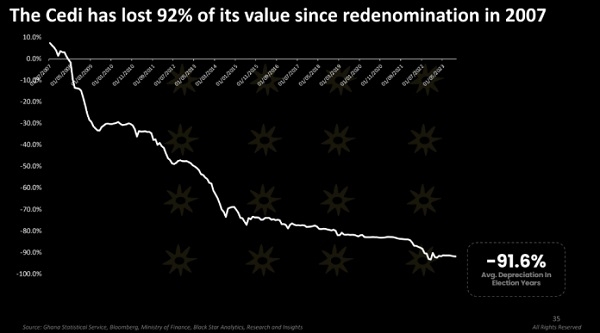The cedi’s struggle to maintain value beyond the short term continues to raise concerns about the economy’s long-term transformation, financial expert Adjei Boateng has said.
Mr. Boateng, a chartered financial analyst (CFA), highlighted the cedi’s significant devaluation, losing 91.6 percent of its value since the 2007 redenomination of the currency due to inflation, primarily fuelled by excessive money supply and exchange rate volatility.
Domestic broad money supply has averaged a concerning 29.4 percent annual increase for over two decades, dwarfing the less than four percent average growth seen in advanced economies and the less than 10 percent average in stable developing countries.
Speaking at the 2nd Annual Forecast Dinner and Recognition Ceremony by CFA Society, Ghana in Accra, he remarked: “In the last 23 years, the cedi has not appreciated once; it is almost as inevitable as the laws of physics that the currency will depreciate”, adding that holding cash without saving or investing over this period would render a certain amount of cedi practically worthless today.
He further illustrated the effect of these factors on the local unit by analysing hypothetical pension contributions primarily invested in Treasury bills. While nominal returns over 10 years, beginning in January 1994, would reach a seemingly impressive 1,451 percent, adjusting for inflation – which averaged 29 percent during the period – paints a different picture, a meagre 3.2 percent real appreciation.
This pattern continues over longer periods, highlighting the illusion of high nominal returns.
From his analysis, while nominal returns would reach 7,036.5 percent and 44,411.1 percent, over 20 and 30 years respectively, the real returns would have been a negligible 48.3 percent and 65.3 percent.
“We would pat ourselves on the back for the nominal returns to investors; but really, the needle has barely moved in real value terms,” he added, urging diversification of investment vehicles.
In a similar vein, Nana Wiafe Boamah, President of the CFA Society, Ghana, in a candid address, expressed concern over the dwindling investor confidence resulting from recent challenges within the ecosystem, emphasising the adverse impact on the investment industry.
He stated that despite the setbacks, there is hope for recovery and cited examples from other nations that successfully rebounded from similar crises.
Drawing parallels with the United States’ historical financial challenges, such as the S&L and housing crisis as well as more recent scandals involving Bernard Madoff and Alan Stanford, Mr. Boamah expressed confidence in the resilience of the local finance and investment sectors. He underscored that Ghana, too, can “build back better” through a concerted effort from all stakeholders.
“We can restore the broken wall of trust within our industry if we will all, our regulators included, commit ourselves to excellence, professionalism and integrity in our dealings. In today’s rapidly evolving economic landscape, the need for astute finance professionals has never been more pronounced. The challenges we face require collective sharing of ideas, knowledge and a commitment to staying ahead of the curve,” he remarked.
While the cedi has shown relative stability since mid-2023 after its 2022 plunge, concerns remain. Recent International Monetary Fund (IMF) loan programme approval and debt restructuring provide temporary relief, but last week’s renewed depreciation against major currencies due to a stronger US dollar underscores underlying vulnerabilities.
This comes as the cedi, last week, weakened against major currencies as a surging US dollar trumped the central bank’s attempts to prop it up. The dollar’s strength stemmed from robust US economic data, which fuelled speculation that the Federal Reserve will hold off on cutting interest rates for the foreseeable future.
This sent the greenback rallying against a basket of currencies, including the cedi. Even an US$11.6million intervention by the Bank of Ghana in the spot market provided little restraint, as the cedi shed 1.60 percent against the dollar to close the week at a mid-rate of GH¢12.53 per dollar on the retail market. The local currency also depreciated against the euro and pound, losing 1.12 percent and 1.11 percent respectively, on the retail market.
Nonetheless, near-term optimism remains, said analysts at Databank. “Despite the prevalence of corporate demand, we expect FX market sentiment to improve as the deal’s inflow should help increase supply-side intervention and cushion the cedi in the near term,” Databank added in its forecast following last week’s development with the Bretton Woods institutions.
